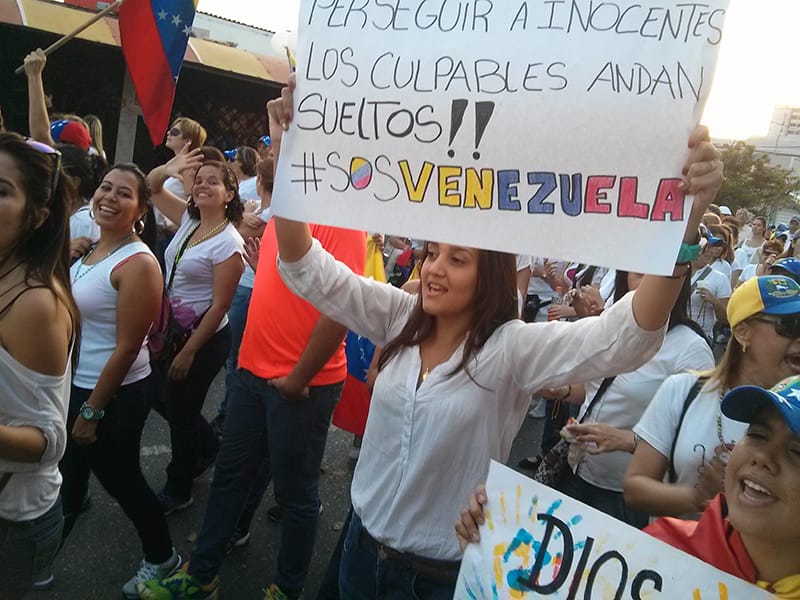Beginning on February 12th of this year, protests and demonstrations began against the socialist government of Venezuela, headed by Nicholas Maduro. Two weeks later the unrest continues on the streets and the level of tension is coming to a head in Venezuela. The parochial vicar of the Sacred Heart of Jesus in Barquismeto, Rafael Nieto, has shared with us his account of life in Venezuela. This is his on the ground report:
Thursday, February 20th, 2014
All of us priests are alright. Worried, but alright. Every night the situation gets worse. We don’t know very well what’s going on in the rest of the country because the newspapers and television stations have been taken over by the government. It is a subtle way of censure, but nonetheless it is censure. Communication via internet hasn’t been cut but the connection speeds are much slower and everything takes a very long time. Here all of the communication with people we know is by mobile phones and whatsapp messaging.
The area where we are is safe and it is calm here. We aren’t facing danger. But there are parts of our parish where pitched battles take place during the night. Sunday afternoon the bishop gathered protesters to pray the rosary for peace and civil rights. There was a large turnout. Since it was completely apolitical, and was only about praying, I thought it would be inappropriate to make announcements at the parish masses and then not attend. So I accompanied the young people of the parish. The path traveled covered about 50% of our parish territory. Almost the whole city turned out, and the people were pleased to see me there. There were no incidents, and there was no noticeable police presence. During the protest I was with a parish nun who’d been detained on Wednesday for defending the students. She’d been on the street and saw how the police started shooting, and she came to the defense of the university students. The nun was detained by the police for 5 hours. She told me that she’d been treated respectfully, but that she was incensed by all she’d witnessed – that it was humiliating how the other detainees were being treated.
There were anti-government slogans heard, and others in support of the students. On the days leading up to this, the students had taken to the streets in a peaceful manner to ask for the end of violence (nearly 25,000 assassinated in the past year), the complete lack of punishment (only 10% of the assassination cases are resolved), the overall corruption, but mostly they protested the food shortages, the long lines, and a dark future. The movement was apolitical. The people are tired of all this, to see that there is no respect for private property and that those in the government do as they please.
Among the student groups who’d taken to the streets were youth groups from the parish. On Sunday morning they’d told me the government’s political police, the GNB (Spanish acronym for Bolivar’s National Guard) took shots at close range on those who were protesting peacefully. To instill fear, there are motor vehicle militant brigades known as the “Collectives”, that are armed Chavez supporters chanting slogans to terrorize the people. There is also talk of infiltrated Cubans who are the ones most stoking the pot.
The majority of protests happen in the evenings. In the daytime everything is completely normal. But as dusk falls, so begin the confrontations between the university students and the GNB. And each day it escalates a bit more. It starts with burning papers, then burning containers, then rocks and shots fired. . .
Last night streets were barricaded and car tires were burned. And from home we could hear the shooting and smell the burning. People from the parish were sending messages relating what was happening on each of their streets. The people are outraged. Many have seen the GNB open fire on the young and many open their homes
Tuesday, February 25th, 2014
After a few days with restricted internet access, Rafael Nieto managed to send a telegram with a short message saying he expected things to normalize shortly. “Hi. I have a working telephone. Everything is alright and calm for now.” (3:50am in Spain).
Toward a different political and economic model
This past 12th of February, protests and demonstrations began against the socialist government led by Nicholas Maduro, stemming from the discontent from supposed civil rights violations, the cronic shortage of basic goods, the high levels of violence and the presumed imposition by Cuba and Castro-style politics in Venezuela.
One of the main reasons for the protests by the student movement and the opposition, lead by Venezuelan Maria Corina Machado and Leopold Lopez, is to change the political and economic model, and for the resignation of Nicholas Maduro and his cabinet.


